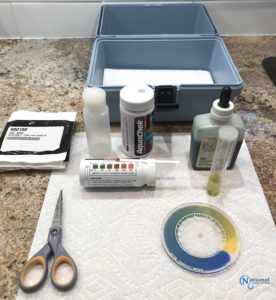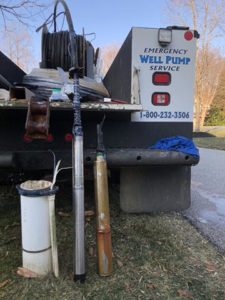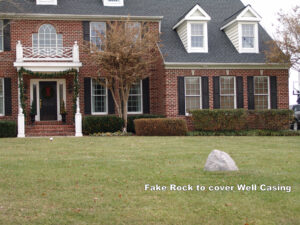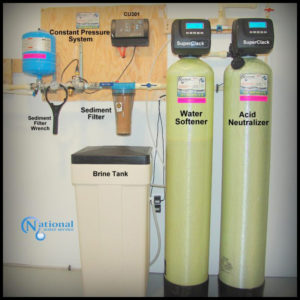US Agency Centers for Disease Control and Prevention estimates that more than 15 million homes get their water from wells.
While the water you pump using a well system is free, there are a lot of responsibilities to take care of for the upkeep and quality of the system.
As a proud homeowner with well water, here are the top 7 things you must know about living with well water.
 Having your water quality checked is the first and foremost thing you need to do annually. It is essential because wells are vulnerable to contamination and might affect your and your family’s health in unforeseeable ways.
Having your water quality checked is the first and foremost thing you need to do annually. It is essential because wells are vulnerable to contamination and might affect your and your family’s health in unforeseeable ways.
One water test annually should be performed to check for coliform bacteria, nitrates, iron, manganese, water hardness, sulfides, and any other potential contaminants in your area.
If you live in a flood-prone location, you may need to have your water tested more frequently or right after a storm. Your local water company should be available to assist and help educate you on what to look for.
 It is typically easiest to have your entire water treatment system tested while you are checking the quality of your well water. In order to make sure your well and, more critically, your well water well pump is operating properly, these maintenance checks are also advised once a year.
It is typically easiest to have your entire water treatment system tested while you are checking the quality of your well water. In order to make sure your well and, more critically, your well water well pump is operating properly, these maintenance checks are also advised once a year.
A yearly examination of these systems is estimated to cost between $100 and $200 and involve looking over exposed parts. A full system replacement or even a small repair might cost much more than an inspection, so staying on top of yearly inspections is critical.
If not damaged by flooding, a well can last for decades, and a well water pump has a life expectancy of roughly 20-23 years, so routine maintenance can save you from needing to replace it too soon. You can also opt for a lifetime well pump warranty with National Water Service, protecting you from unexpected breaks, repairs, or total loss of water pressure while you’re in your home.
A water well pump is necessary if you are an avid well water user. In times of high demand or lack of water supply from the municipality, a good pump keeps a steady water supply available and acts as water storage. Your well water tank’s pressure must be kept at a certain level to maintain optimal operation. Each pressure tank contains a switch that regulates the pressure needed to turn the tank on and off. It instructs the pump to turn on and off, in other words.
The appropriate pressure settings are typically 20/40, 30/50, and 40/60 for well water tanks. Your home’s size, consumption patterns, number of stories, and distance between your faucets and the water pressure tank will all affect the ideal pressure setting.

Investing in a well covering or casing is a smart move for extra protection and is relatively inexpensive while also being aesthetically pleasing.

Some well water company experts recommend using a water softener if you are a regular well water user. You may avoid mineral build-up and hard water stains by using your water softener to fight that mineral content. It has a brine tank where regular salt is used to keep the water’s mineral content high.
Depending on your consumption, you will need to check the salt level and refill it each month.
To treat hard water with a home remedy, you can always opt for the proven scrubbing method with white vinegar and baking soda. And can squeeze some lemon to reduce the complex properties while washing hair or taking a bath. However, this is often a time-consuming and temporary solution compared to having a water softener installed.

However, if you discover that a filter is not doing the trick, speak with a well-water system contractor to identify the source of the issue. You want to stay on top of any odors your water has, as even with well water these are not common and should not occur in the water you drink and clean with.
Drinking water from a well older than fifteen-twenty years old is not something we consider safe. If you are a new homeowner of a well, take measures to check the life of the well and take preventive water tests.
If your well is very old, get in touch with a professional or a well water company to talk about replacements, updates, and other well water services and maintenance.
Understanding local water issues might help you take preventative action to safeguard your well. Find out if there are any recognized water problems in the region and if there are any worries about contamination from runoff from neighboring industrial or agricultural activities.
If you are moving into a home with a well, ask the current owner for a history log to learn more about the well’s past, present state, and capacity. You can use this information to determine the well’s history, capacity, and flow rate and whether it will suit your family’s demands. Asking the house’s seller about the water treatment practices they are using now is also a smart option.
The quality of groundwater varies widely and is constantly shifting. Your home may have entirely different water issues from your neighbor’s down the street. Because of this, consulting a reliable well water company on water purification might be pretty beneficial.
With the right steps and partnering with the right local water company, you can manage your well water with ease.
National Water Service has been providing residential & small commercial water treatment, plumbing & well pump services for over 45 years. We specialize in water treatment, filtration & purification solutions as well as general plumbing to ensure clean, safe water for our customers in Maryland, DC & Northern Virginia.
Mon - Thurs
7:00am - 5:00pm
Friday
7:00am - 4:00pm
Sat - Sun
Emergency Service Available
National Water Servicing Corporation — 2025 All Right Reserved ™